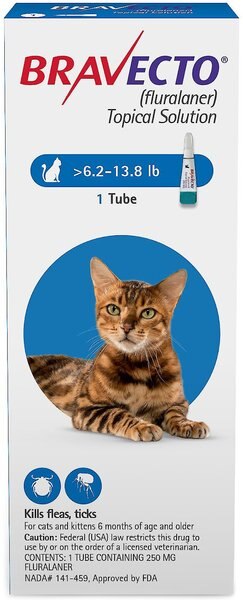Specifications
| Item Number | 146046 |
|---|
| Common Brand Name(s) | Bravecto |
|---|
| Generic Name | Fluralaner |
|---|
| For Use With | Cats |
|---|
| Administration Form | Topical |
|---|
| Usage | Prevention, Treatment |
|---|
| Repels or Prevents | Fleas |
|---|
| Kills or Treats | Fleas, Ticks |
|---|
| Lifestage | Adult, Kitten, Senior |
|---|
| Breed Size | Small Breeds |
|---|
| Product Form | Solution |
|---|
| Strength | 250 mg Fluralaner |
|---|
| Health Condition | Fleas, Ticks |
|---|
| Drug Type | Parasiticide |
|---|
Uses
Bravecto kills adult fleas and is indicated for the treatment and prevention of flea infestations (Ctenocephalides felis) and the treatment and control of black-legged tick and Asian longhorned tick infestations for 12 weeks in cats and kittens 6 months of age and older, and weighing 2.6 pounds or greater. Bravecto is also indicated for the treatment and control of American dog tick infestations for 8 weeks in cats and kittens 6 months of age and older, and weighing 2.6 pounds or greater.
Possible Side Effects
The most commonly reported adverse reactions include vomiting, itching, diarrhea, hair loss, decreased appetite, lethargy, and scabs/ulcerated lesions.
Drug & Food Interactions
No adverse reactions were observed from the concurrent use of Bravecto with other medications.
Precautions
BRAVECTO has not been shown to be effective for 12-weeks’ duration in puppies or kittens less than 6 months of age. Fluralaner is a member of the isoxazoline class. This class has been associated with neurologic adverse reactions including tremors, ataxia, and seizures. BRAVECTO Chew: The most commonly reported adverse reactions include vomiting, decreased appetite, diarrhea, lethargy, polydipsia, and flatulence. BRAVECTO is not effective against lone star ticks beyond 8 weeks of dosing. Seizures have been reported in dogs receiving isoxoline class drugs, even in dogs without a history of seizures. Use with caution in dogs with a history of seizures or neurologic disorders. The safety of BRAVECTO has not been established in breeding, pregnant and lactating cats. Neurologic adverse reactions have been reported in cats receiving isoxazoline class drugs, even in cats without a history of neurologic disorders. Use with caution in cats with a history of neurologic disorders.
Disclaimers
This item is excluded from the first-time Autoship promotion.


Comment